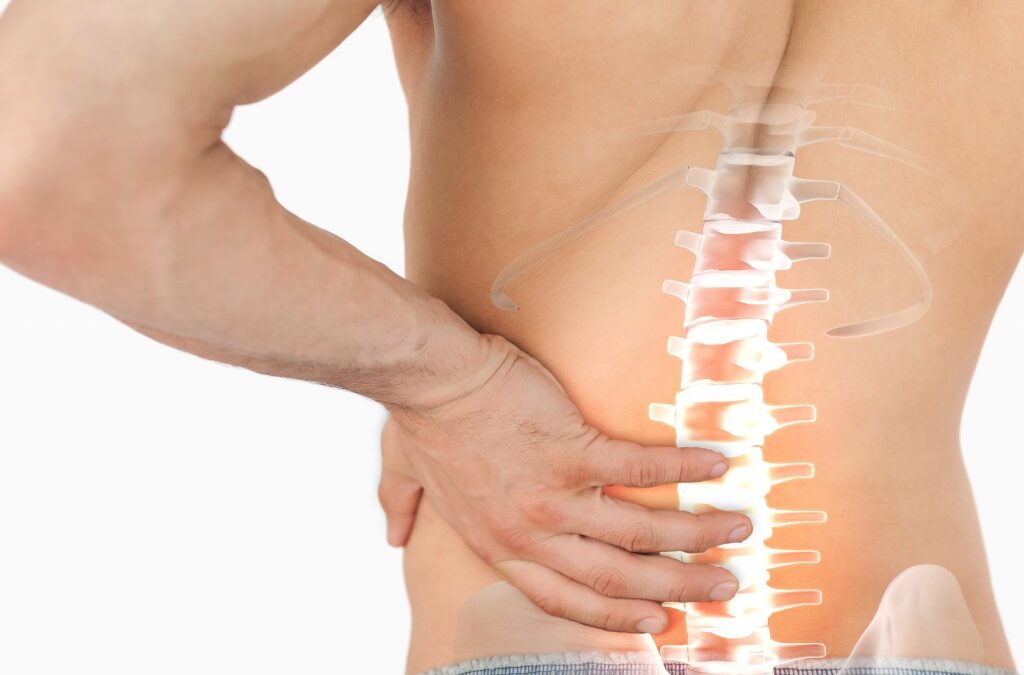Your back is a complex structure of bones, muscles, ligaments, and discs. Most people know what bones and muscles are, but discs can present a bit of a challenge. When you think of your spine, think of the 33 bones, called vertebrae, stacked neatly on top of each other.
Between each bone is a pillow of sorts – a jelly filled donut that cushions the movement of the spine. If you didn’t have these pillows, or discs, the bones of your back would grind over each other and cause pain.
Discs present problems when they become herniated. This means that the jelly inside the donut starts to bulge outward from its usual place. When this happens, the bulging can push on important nerves that run close to the spine and supply feeling to different parts of the body. Nerves that are pushed on cause pain wherever they supply feeling.
For instance, a herniated disc in the neck can push on the nerve that serves the arm. This would cause pain and discomfort in your arm when the true problem is in the neck.
At Sports and Spine Orthopaedics, we believe in treating herniated discs with the least invasive options first. However, if your disc is resistant to treatment or causing excruciating pain, our spinal surgeon Dr. Wolf is best in his field, and they can get your feeling your best with the least invasive surgery possible.
Causes
Researchers are not quite sure what causes disc herniation. As you age, the normal wear and tear on your back can lead to the disc pushing out of its normal shape. In addition, age tends to dehydrate the disks, and this lack of water makes the disk less compliant. Since it can’t move as well as it once did, even small movements can sometimes cause a disc to rupture or herniate.
Although most people cannot point to a particular action that caused the herniation, it is known that lifting heavy objects incorrectly can cause the disc to pull out of shape. Twisting and pulling large objects are also causes of disc herniation.
This is why it is important to use proper lifting techniques, and our physical therapists can help you learn how to protect your back against lifting related injury.
Symptoms
You can actually have a herniated disc and not be aware of it. If the disc is pulled out of shape and not impinging on a nerve, you could easily not have any symptoms associated with the herniation. However, the most common symptom of a herniated disc is pain in the area.
This is from the disc pushing on adjacent nerves. It is not uncommon to have pain radiate down an arm or a leg, depending on where the injury occurred and which nerves are involved.
You can have numbness and tingling in your arms or legs, as well. These are often signs of a more severe nerve involvement. Weakness and an inability to use an arm or leg are warning signs that should be immediately reported to a doctor. Also, if you have trouble with your bowel or bladder, it may be a sign that other nerves have been impinged by the herniated disc. This means you need to see a doctor as soon as possible.
Treatments
Treatment can be approached in a variety of ways with a herniated disc, and Sports and Spine doctors are dedicated to using the least invasive methods first. Approximately 9 out of 10 people who use more conservative treatments are able to heal their herniated disk. In rare cases, surgery is necessary.
Medications are usually the first line of treatment for this condition. Over the counter medications, such as ibuprofen, are often enough to decrease the inflammation in the area and reduce pain. In certain circumstances, narcotic medications are used, but these are rarely needed.
One of the newest forms of treatment is nerve pain medications, such as Lyrica, that can help with the pain of the impinged nerve. Cortisone shots directly into the disc can also reduce pain and inflammation.
Physical therapy is an important component for treating a herniated disc, and we have the therapists to help you rehabilitate your back. Heat, ice, exercises, traction, and bracing are all methods that we use to assist you in healing the injured disk. In rare cases, you may need surgery to repair the problem.
Our Spinal surgeon can guide you through the process for surgery and present you with the pros and cons. We are on the cutting edge of new procedures in spinal surgery that are less invasive than surgeries in the past.
Do you have a herniated disc? Not a problem. Schedule a consultation with Dr. Wolf, and we can start you on your road to recovery.


Recent Comments